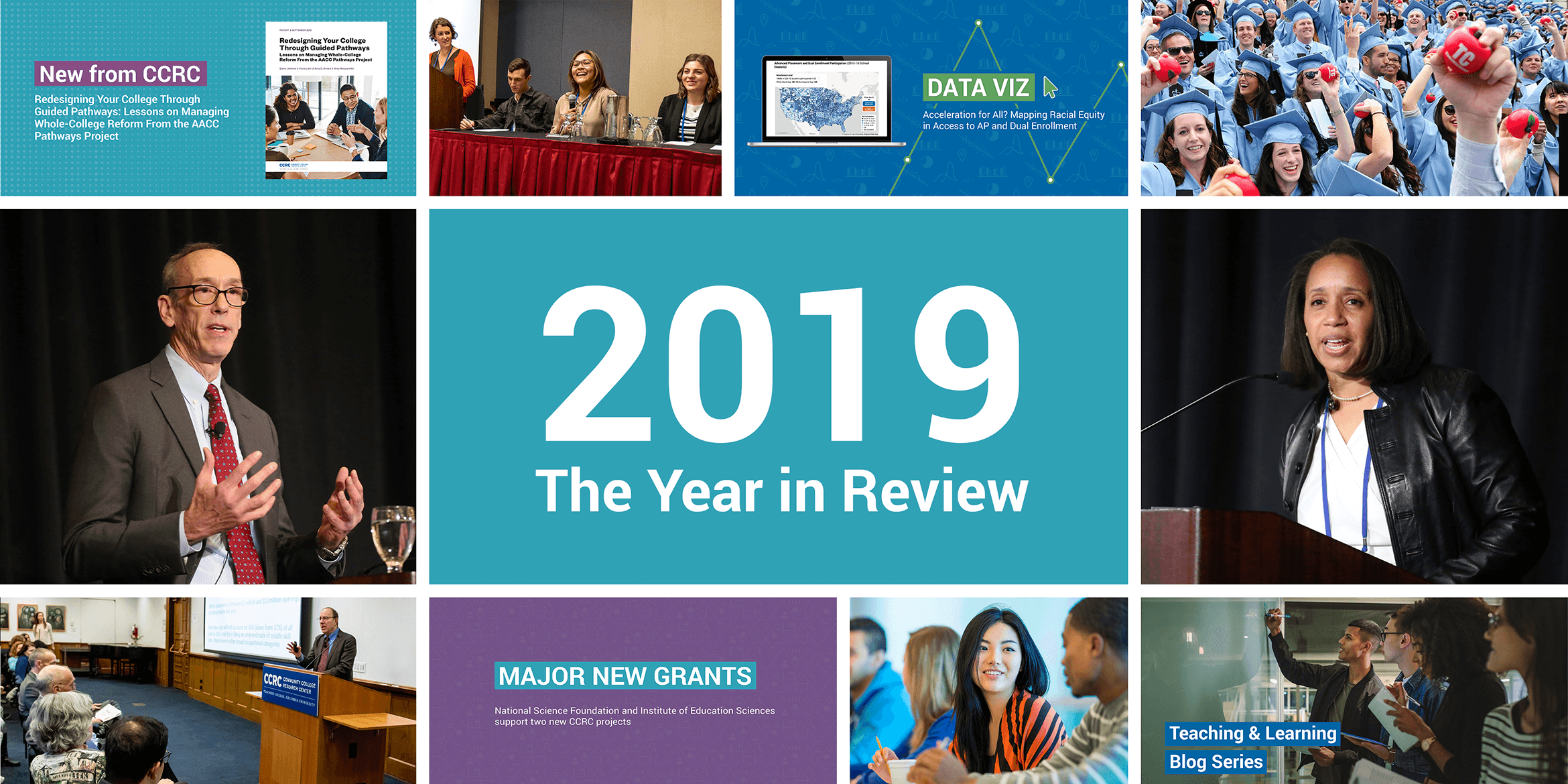We’ll forgive you if you haven’t been able to keep up with everything going on at CCRC this year. After all, in 2019, the center posted 31 papers and 32 blog posts; our researchers gave 57 presentations at 27 different conferences; and our staff was instrumental in planning and hosting the capstone convening of the Center for the Analysis of Postsecondary Readiness, which included plenary panels, keynote presentations, and 18 breakout sessions. Beyond these impressive numbers, CCRC stepped up our work on equity in higher education and on workforce development, in addition to continuing research on topics including guided pathways, advising reform, and teaching and learning. Before 2019 ends, we take a look back at some highlights from the last 12 months.
March: Paul Osterman speaks at CCRC as part of center’s focus on workforce development
The intersection of community colleges and the labor force factored into several aspects of our work this year. At a CCRC talk in March, Paul Osterman, a member of MIT’s Task Force on the Work of the Future and a professor at MIT’s Sloan School of Management, forecasted that robots will not, in fact, take away everyone’s job. And moving forward, Osterman will contribute to a CCRC project launched in July to explore how employers’ adoption of new technologies will affect community colleges’ workforce education programs. To continue the conversation, in May, CCRC welcomed Michelle Weise, the chief innovation officer at the Strada Institute for the Future of Work, for a discussion on how higher education can change to better prepare students for tomorrow’s workforce needs. And as part of a separate project launched in March, CCRC researchers are studying how community colleges can align credit and noncredit workforce education programs.
May: CCRC staff members earn degrees from Teachers College
Six current and former CCRC staff members earned their master’s degrees or PhDs from TC this year. Congratulations to Tam Do, Marty Hernandez, Yuxin Lin, Adnan Moussa, Rina Park, and Thalia Rodriguez for reaching such an impressive milestone.
June: CCRC releases a pair of reports on humanities and liberal arts
Despite hand-wringing about the death of humanities and the liberal arts, humanities education is not in decline in America’s community colleges, CCRC researchers found. In two papers released in June—one examining the provision of humanities and liberal arts at two-year colleges and another focused on how taking such courses affects transfer and outcomes at four-year colleges—CCRCers shed light on the state of non-STEM postsecondary education.
July: CCRC earns major federal grants
The National Science Foundation’s Improving Undergraduate STEM Education program awarded CCRC nearly $3 million over three years to examine the intersection of guided pathways and STEM and explore how whole-college reform can help students succeed in STEM programs. Separately, the U.S. Department of Education’s Institute of Education Sciences (IES) provided CCRC with $1.4 million to study English language learners in community colleges for three years.
September: CCRC releases significant guided pathways report
Redesigning Your College Through Guided Pathways and its accompanying suite of case studies offer important insights into how institutions across the country are implementing comprehensive college reform. The report describes four phases of transformation and provides a roadmap for leaders looking to build consensus and scale guided pathways practices on their campuses. The five case studies focus on Linn-Benton Community College in Oregon, Cuyahoga Community College in Ohio, San Jacinto College in Texas, Wallace State Community College in Alabama, and Community College of Philadelphia.
Fall: CCRC spotlights practitioner perspectives
Little higher education research focuses on what happens inside the classroom, and even less is written by the people who spend the most time there. Two blog series this year aimed to change that dynamic and tap into the voices of the practitioners carrying out the reforms that CCRC studies. The teaching and learning blog series featured instructors’ stories about professional development and implementing models like Lesson Study, as well as a college president’s perspective on fostering a culture that promotes strong teaching. Meanwhile, as part of the guided pathways blog series, practitioners at several colleges described their experiences implementing whole-college reform.
October: CCRC sharpens our focus on equity
CCRC’s work addressed equity in several ways this year. Among other efforts, in May, we published a literature review examining English learners’ academic experiences and outcomes in community colleges. In July, we kicked off an IES-funded project that will allow us to undertake more of this work. And at our November CAPR conference, attendees and presenters considered the role of equity in developmental education. We also continued studying ways to strengthen the benefits of college acceleration strategies like dual enrollment for low-income and minority high-school students, producing an October working paper and an accompanying data visualization that maps racial equity in access to AP and dual enrollment.
November: CAPR conference considers the future of developmental education
For the last five years, CCRC has made significant contributions to the study and reform of developmental education through its partnership with MDRC on the IES-funded Center for the Analysis of Postsecondary Readiness. In the culmination of CAPR’s work, more than 300 practitioners, policymakers, philanthropists, researchers, and students gathered in New York City to discuss the state of dev ed research and where the field will go. CAPR also released findings from three studies in November: a report on the impacts of Dana Center Mathematics Pathways, a report documenting developmental education practices across the country, and two papers on a computer-based instructional model.
Thank you for a wonderful year. We wish everyone a rejuvenating holiday season and look forward to more insightful research in 2020!




